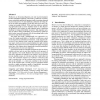Free Online Productivity Tools
i2Speak
i2Symbol
i2OCR
iTex2Img
iWeb2Print
iWeb2Shot
i2Type
iPdf2Split
iPdf2Merge
i2Bopomofo
i2Arabic
i2Style
i2Image
i2PDF
iLatex2Rtf
Sci2ools
114
Voted
LCTRTS
2009
Springer
2009
Springer
Push-assisted migration of real-time tasks in multi-core processors
Multicores are becoming ubiquitous, not only in general-purpose but also embedded computing. This trend is a reflexion of contemporary embedded applications posing steadily increasing demands in processing power. On such platforms, prediction of timing behavior to ensure that deadlines of real-time tasks can be met is becoming increasingly difficult. While real-time multicore scheduling approaches help to assure deadlines based on firm theoretical properties, their reliance on task migration poses a significant challenge to timing predictability in practice. Task migration actually (a) reduces timing predictability for contemporary multicores due to cache warm-up overheads while (b) increasing traffic on the network-on-chip (NoC) interconnect. This paper puts forth a fundamentally new approach to increase the timing predictability of multicore architectures aimed at task migration in embedded environments. A task migration between two cores imposes cache warm-up overheads on the ...
Related Content
| Added | 20 May 2010 |
| Updated | 20 May 2010 |
| Type | Conference |
| Year | 2009 |
| Where | LCTRTS |
| Authors | Abhik Sarkar, Frank Mueller, Harini Ramaprasad, Sibin Mohan |
Comments (0)

